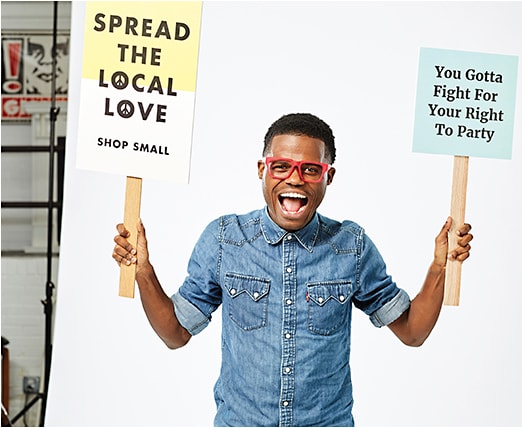See how one fiercely independent ECP took a stand against Warby Parker—and stood up for shopping small + local


cliff Balter was born into optical. His family owns a small, local chain of eyewear stores in Philadelphia, and he was already working in them by age 13. At age 26, he opened his own downtown Philadelphia shop, InnerVision Eyewear. That was in 2002, and he has been balancing doing his own thing with fighting the big boys ever since.
No competitor has charged his independent spirit—and offbeat sense of humor—more than Warby Parker. And, like any good front-line fighter, Balter has used some of the enemy’s own tactics against it.
Here’s what he says about his battleground strategies for winning in a brick-and-mortar business.
THE POSITIONING
When it comes to competing against online retailers and the likes of Warby, Balter’s first line of defense was a combination of smart pricing and exclusivity. “Our shop is a little unusual because we sell only exclusive frame brands, but not all of them are expensive,” he says. “We started a brand called Philly EyeWorks a few years ago to help defend ourselves from online retailers like Warby Parker. It’s a very reasonably priced line and is available in two interchangeable finishes, 18 front colors, and 12 temple tones. It’s inexpensive, though it feels and looks like a boutique brand.”

THE NARRATIVE
Balter says that everyone has “the best” customer service and that is crucial…but today it isn’t enough when it comes to competing with online. “In optical, the ‘Warby Parker effect’ has definitely changed things for local shops,” explains Balter.
“It’s not just about selling cheap glasses or selling them online,” he says. “The ‘Warby effect’ is the false narrative/fake news that they have put out there that there is no real difference in quality between $99 glasses and higher-quality, higher-priced glasses.”
THE CAMPAIGN
“To compete,” says Balter, “we held a promotional event outside the Warby Parker shop in downtown Philly on their opening day. We got the proper permits and promoted our Philly EyeWorks brand outside of their shop. We carried ‘Shop Local’ signs and handed out discount cards in front of their store—an idea we actually got from Warby.”
THE BACKSTORY
Balter explains, “A few years ago, Warby Parker had a marketing bus that went around the country and often parked in front of or near independent optical shops. Two Saturdays in a row, they parked right out front of our shop. As much as we disliked it happening to us, we thought it was a great idea, so we borrowed it and promoted ourselves outside of theirs.”
How’s that for underscoring the importance of both brick-and-mortar and small business?
THE FEEDBACK
“It went really well,” says Balter. “The day before our promotion outside their shop, articles [about the effort] ran in The Philadelphia Inquirer and on philly.com . We immediately received an outpouring of positive feedback. It’s only been a couple of months, but sales of Philly EyeWorks glasses have more than tripled over the same period last year.” According to Balter, those are dollars that came at the expense of Warby and other online retailers.
THE PHILOSOPHY
“Small business is a huge passion of mine,” explains Balter, “because I think it’s the most important social issue facing our country. The idea of shopping small and shopping local feels like it should be a political statement, but it really is something that resonates with almost everyone, regardless of political affiliation, age, race, gender, etc.”
Balter says he has found that whether it’s a discussion of online or big-boy brick-and-mortar competition, “almost everyone can appreciate that very small businesses represent an important part of our communities.”
How can brick-and-mortar compete with online? “When it comes to eyeglasses,” explains Balter, “it is still very possible to shop small because of the relationship aspect. Having a long-term relationship with an optician is a great way for a consumer to ensure they get a great pair of glasses for themselves—time after time.”
Online cannot compete with that relationship, or with the value of shopping local. “As the campaign unfolded,” recalls Balter, “I really was surprised to see how central optical shops are to the ‘shop small’ movement.”

—Stephanie K. De Long



